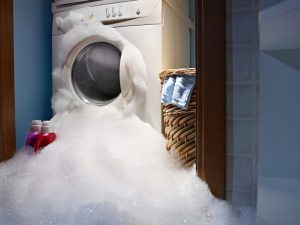In the world of appliance problems, preventing washer leaks can help you avoid costly water damage to your home. Different issues can befall different makes or models of washing machines but most share common areas of vulnerability. Hoses, connectors,  seals and drain lines are all susceptible to leaking. Aside from being costly to already expensive washing machines, washer leaks can cause extensive damage to your floors, walls and surrounding appliances as well. Although it’s impossible to predict a washer leak, following these simple tips can help you avoid potential problems.
seals and drain lines are all susceptible to leaking. Aside from being costly to already expensive washing machines, washer leaks can cause extensive damage to your floors, walls and surrounding appliances as well. Although it’s impossible to predict a washer leak, following these simple tips can help you avoid potential problems.
Should You Be Worried About Your Washer Leaking?
The answer to this question is most likely “yes”. If a washing machine hose bursts, catastrophic damage can occur throughout your home. However, hoses are just one example of where your machine may spring a leak. Rubber hoses dry out and crack over time especially in dry climates. Drain lines become clogged, particularly if you overuse detergent. Hose connections are under stress every time your machine cycles (ever hear that “thunk!” sound?). Internal washing machine parts (pump, seals, etc.) wear out or fail from age or manufacturer defect.
How to Avoid Washing Leaks
Do not overuse detergent or other laundry products. Regularly inspect and clean door gaskets on front load machines. Replace washer hoses and check connectors periodically. Install a single level ball valve and an emergency water shutoff kit. Upgrade from rubber to braided metal or coated stainless hoses and corrosion-resistant connectors. Have a professional appliance service company inspect your washer once a year and replace any worn or old parts. And what is the simplest way to prevent problems? Simply turn off the water to your washer when you aren’t using it. This won’t keep hoses from rupturing while the machine is running but it will deter leaks from happening when you’re away. Use all of these tips to keep your washer running smoothly and your home dry!
Washer Leaking Water? Do This First
If you notice any water around or behind the washer, turn off the washer hose valves immediately. By doing this, no further water can pump out and worsen the problem. If you can determine the source of the leak (cracked hose, leaky connector), you can try to handle the problem yourself. However, it’s always safest to call in a washing machine repair professional. They will have the right tools to find and fix the problem and the experience to handle it properly.
While most people will never experience a washer leak, having one happen in your home would be enough to make you wish you had paid closer attention to the hoses and drain lines beforehand. Taking these few simple steps to prevent washer leaks may save you time, money and heartache later.

